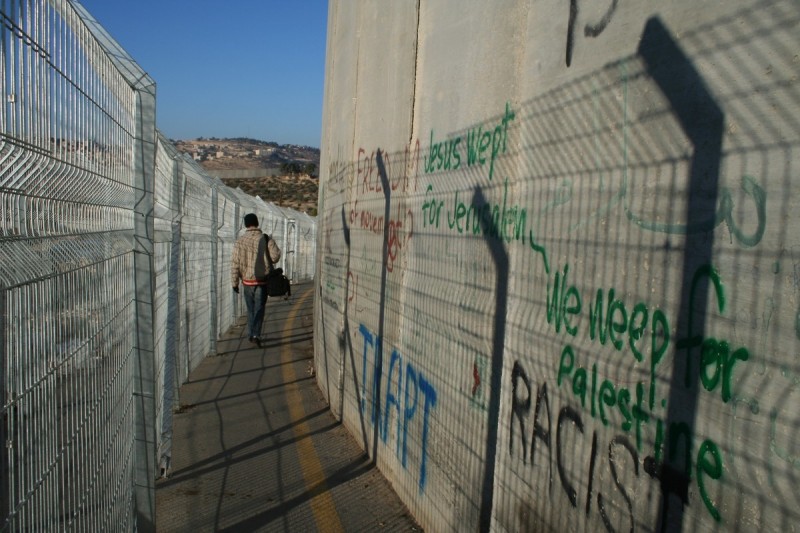Amnesty report on Israeli apartheid demands debate on Canada’s role

A Palestinian man walks through a major Israel Defense Forces checkpoint at one of the main exits of Bethlehem in the West Bank. Photo by Jill Granberg/Flickr.
Israel maintains an “apartheid” regime of oppression and domination over the Palestinian people as a whole. This is the explosive conclusion of an extensive new report by Amnesty International, the far-reaching implications of which are poised to create a serious headache for the Trudeau government. While the temptation will be to deny, ignore, or slander Amnesty’s findings, an honest reckoning would provide Canada with an opportunity to take a leadership role in the movement against the State of Israel’s treatment of Palestinians, which according to Amnesty constitutes a “cruel system of domination and a crime against humanity.”
Amnesty’s report is by no means an outlier, but represents a growing consensus among the human rights community, which has increasingly used the terminology of “apartheid” to describe a system of Israeli oppression. This includes the 200 or so Palestinian civil society organizations who have urged the United Nations to investigate Israeli apartheid, and many prominent Israeli human rights groups, including B’Tselem and Yesh Atid, who have called out their own government’s actions in this exact way. It also includes veterans of South Africa’s anti-apartheid struggle, notably current President Cyril Ramaphosa—who said in 2021 that Israel could “quite easily” be considered an “apartheid type of state”—and the late Desmond Tutu, who said that the situation facing Palestinians was worse than South Africa’s version of apartheid. Even former UN Secretary-General Ban Ki-moon wrote last year that Israel’s rule over the Palestinians “arguably constitutes apartheid.”
In all likelihood, however, Canada will either try to ignore Amnesty’s report altogether, or dismiss its conclusions out of hand. Amnesty’s report follows a similar publication by Human Rights Watch in April of last year, which concluded that Israeli officials are committing the crimes against humanity of “apartheid” and “persecution” against the Palestinian people. At the time, it was almost completely ignored by the government, until former Green Party MP Jenica Atwin—who had called for an end to “Israeli apartheid”—crossed the floor to join the Liberal caucus. Her dramatic decision was quickly pounced upon by the Conservatives who turned it into a political wedge issue. Forced to respond to repeated attacks, then Foreign Affairs Minister Marc Garneau declared that Canada “categorically” rejects the “apartheid label,” with no indication that he had actually read the HRW report.
Amnesty might be harder to ignore, as a prominent and reputable organization with significant support among Liberal voters. The truth is that Amnesty’s report creates a nearly impossible situation for the government: it calls out the apartheid character of a state with whom Trudeau boasts of having shared values, and it exposes Canada’s warm bilateral relationship with Israel as going in exactly the wrong direction.
Whereas Trudeau’s modernized free trade agreement with Israel gives preferential status to goods produced within Israeli settlements, Amnesty demands that states ban their importation into the country. Whereas Canada sold almost $19 million in weapons to Israel in 2020, Amnesty demands a comprehensive arms embargo. Above all, the organization calls on countries to “review any cooperation and activities with Israel to ensure that these do not contribute to maintaining the system of apartheid”—a test that Canada would certainly fail.
Indeed, an honest reckoning with Amnesty’s analysis would force a serious re-examination of the Canada-Israel bilateral relationship. Canada may even be compelled to take a leadership role in a coordinated, international response against Israel’s system of apartheid, as Mulroney helped to coordinate action against South African apartheid (even if his role is often exaggerated).
At a minimum, Trudeau needs to encourage an open debate on Israeli apartheid, rather than shutting down those in his caucus who will be rightfully concerned by the conclusions in Amnesty’s report. A government which forbids its MPs from openly discussing the findings of a leading global human rights organization—when it concerns Israel—will lack the moral authority to claim to defend human rights anywhere else.
Michael Bueckert is Vice President of Canadians for Justice and Peace in the Middle East (CJPME). He has a PhD in Sociology and Political Economy from Carleton University. Follow him on Twitter @mbueckert.

